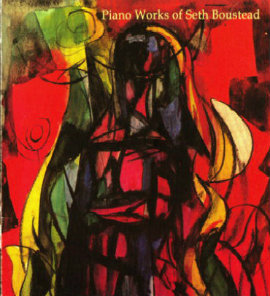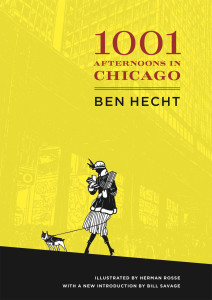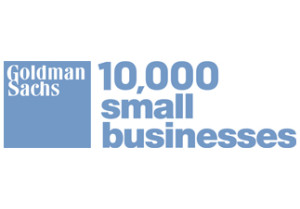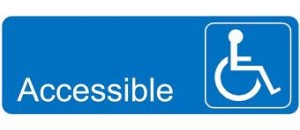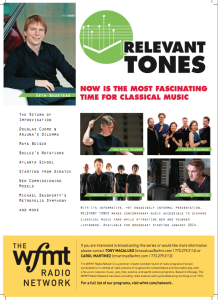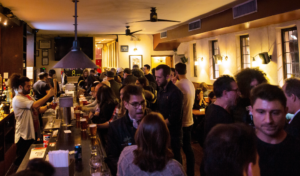First published October 20, 2009 in the web magazine “New Music Box”
I’ve been going through a bit of a crisis lately which I hope will pass. The crisis has to do with composing and specifically why I compose music. It’s not writer’s block. I have as many ideas as I’ve ever had, although time in which to notate them is always short. No, it’s not writer’s block but a sense of ennui. I keep asking myself: “Why am I writing concert music in this day and age? Is it relevant? Does it have a place in the world at large?” I didn’t always worry about things like this…
When I was young and first knew I would spend my life as a composer, I had the idea that fame and fortune awaited me. I could picture myself strutting to the premiere of my new mixed ensemble piece, crowds gathering, tough bodyguards ushering me into the concert hall while a string quartet followed me playing the theme from Shaft (my arrangement, of course).
I had it all worked out: I would move to a big city (I was born in a place where you see shotguns in the backs of trucks and where people have kids when they’re fifteen), get a menial job, write music at night, arrange my own performances and the rest would take care of itself. It seemed so simple. I mean, who doesn’t love concert music? Who doesn’t feel a thrill when they get to hear a new World Premiere? Who doesn’t wait with bated breath for the new John Adams opera, or remember the first time they heard Kronos Quartet do Black Angels live?
A lot of people, apparently.
I guess I’m naive, but this has always been a shock to me. I’m still surprised when I go to parties and tell people that I’m a composer and they look at me like I climbed out of a time machine. I still don’t understand why I have to spend so much time telling them that it’s 2009 and why would my music sound like Mozart’s? Any more than, say, the novelist Jonathan Lethem would write like Balzac.
I mean, people still make violins, cellos, and other acoustic instruments, so it makes sense that people would still write for them. Right? And it makes sense that a 21st-century American composer would have different sounds in his ear than say an 18th-century Austrian composer. And yet… And yet, when they hear the word composer it’s as if they expect me to wear a wig, drink absinthe, and write with a quill pen. Weird.
It was around then that I started to envision another version of the future, this one slightly less self-centered. I imagined that people would actually know about contemporary music, would have heard of the major composers of the last century, and would know what I was talking about when I told them what I do. I imagined a community of people going to contemporary concerts, listening to contemporary music, debating passionately about new pieces and composers.
I imagined these people becoming more interested in contemporary music and attending more concerts. I imagined them then taking an interest in the music of the past and taking music appreciation classes and attending symphony concerts. I imagined a renewed burst of enthusiasm for the art form of music composition, contemporary and throughout the ages.
I imagined that diehard Classical fans would not turn their noses up at the fact that an orchestra had the gall to program a contemporary piece, but would, instead, work to understand it on its own terms and not compare it to their favorite 19th-century warhorse.
This vision of the future has never left me and, crazily enough, it’s now almost stronger than the other vision. The more I talk to people who read modern fiction, attend new plays, and see modern dance performances, the more frustrated I am that they don’t know about contemporary concert music. Over the years this frustration built until I felt that I had to put my money where my mouth was and do something about it.
And so I started Accessible Contemporary Music. I did it to bring a change into the world: to create an environment in which contemporary music was better known and appreciated, to create resources for composers, especially those without resources, and to educate people so that they can step into a concert hall without fear of the unknown.
I got lucky and quickly found like-minded musicians willing to play for peanuts and the occasional macadamia nut. I was also smart enough to ask for advice from anyone and everyone in the arts community who would have lunch with me, so I was able to assemble a very helpful team early on.
We decided that there was a vast and untapped resource of composers out there who labor in obscurity and who will probably never get to hear their music. I have met a surprising number of people who compose or write music and have never heard it performed. They may have majored in music and simply lost touch with musicians or they don’t have enough money to hire musicians, they aren’t going to win competitions and most performers aren’t interested in contemporary music, especially music by unknowns.
Our idea was that if this group of people could hear their music and get excited about composing again, they would come to concerts and support the contemporary music scene.
We started a project called Weekly Readings in 2004 to address this situation. The idea was that we would read and record a piece by every composer who submitted and post it to our website. We were very idealistic about it!
No matter the quality of the work, no matter the craft of the composer, every composer should hear his or her music played. How can you get better if you’re not hearing your music?! If the composers hear their music it will renew their interest in writing music, if their interest in writing music is renewed they’ll be more likely to attend concerts and we will begin to form a groundswell.
Aside from underutilizing the very people who would most be interested in contemporary music, the other problem we identified is that audiences have this holier-than-thou perception of the composer and of composed music in general, which is apparently off-putting.
To combat this we started Composer Alive in which we work with one composer who writes a new piece for us in installments. We record each installment as we receive it so that the composer can hear the piece played as he writes it and rewrite and send the next installment until the piece is finished.
By letting people hear the piece composed in chunks, from the first draft through the rewrites, we are opening the compositional process to them and investing them in the project, making it much more likely they’ll attend the concert. The Composer Alive concert remains our most successful annual concert event.
It was only once these online projects were established and became successful that we started a true concert season, now only in its third year. The last several concerts we’ve given have been sold out concerts and yes, people were passionately debating the music, among other things, at the reception. By starting with these online projects and developing a reputation through them, we were able to start our concert season with a large audience following from day one.
Two years ago we started the ACM School of Music in Chicago’s north side neighborhood of Ravenswood. We offer piano lessons and a music theory and music composition class. The composition class attracts a variety of people: an architect, a salesman, a graphic designer, who have nothing in common except for the fact that they’ve either never composed before or haven’t composed in years and wouldn’t be composing now if it weren’t for the class.
At the end of the class they hear their music performed by professional musicians and the way their faces light up is truly magical. They also come to concerts. Religiously.
I often hear people say that the future of modern music is in film. Although this statement usually annoys me I mean I understand that dissonance is more palatable when married with certain images but can’t people just use their imaginations in a concert setting? but after thinking about it, I decided to start a film festival.
In 2005 the Sound of Silent Film Festival was born, bringing newly composed scores, usually by Chicago composers, performed live to modern silent films in a fun, BYOB event that brings young people in droves. Now even Wicker Park hipsters can say they’ve seen a contemporary music event!
In 2007 we made a 60-minute documentary film about our collaboration with Beijing composer Xiaogang Ye as part of our Composer Alive: Eastern Expressions project. The film is our most ambitious attempt to bring contemporary music to a wide audience. It was shown on Chicago’s PBS station, WTTW in December of 2007 and was watched by over 40,000 people.
We still have a lot of work to do to create the community that I envisioned so long ago but we’re on our way. More of our concerts sell out than not, composers on our Weekly Readings series are hearing their music, often for the first time, audience members are telling us that they have become curious about contemporary music and are hungry to hear more, and people in our ACM School of Music are playing contemporary music and hearing the music that they themselves write.
The more I work with ACM and see the success we are having in reaching new audiences, the more convinced I am that focusing on contemporary music is the way to revitalize the Classical, (for lack of a better term,) tradition as a whole.
This is only the beginning. If the ideas we’ve started catch on, we can build an audience for new music. We can recreate a global community of people who care, who attend concerts and debate and talk about contemporary music, breathlessly wait for the next World Premiere, and even compose their own music.
We can make composing relevant again. We can answer the question: Why compose now? The answer will be because it matters and because I can get famous doing it! If we make this happen, then I can have my bodyguards and my string quartet following me to my next premiere. I’ll just have to figure out how the cellist will manage it…
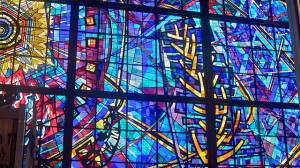 When I was a composition student at the University of Missouri in the early ’90’s I discovered a book of paintings in the library by Abraham Rattner and fell completely in love with his use of color, dense imagery and religious inspiration. Then, after I moved to Chicago, I read Henry Miller’s The Air Conditioned Nightmare about a car trip he took across the United States in 1945 and who was his traveling partner but Abraham Ratter!
When I was a composition student at the University of Missouri in the early ’90’s I discovered a book of paintings in the library by Abraham Rattner and fell completely in love with his use of color, dense imagery and religious inspiration. Then, after I moved to Chicago, I read Henry Miller’s The Air Conditioned Nightmare about a car trip he took across the United States in 1945 and who was his traveling partner but Abraham Ratter!